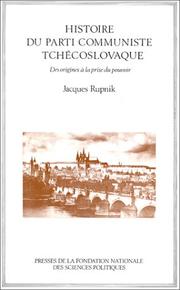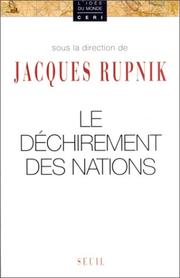| Listing 1 - 10 of 49 | << page >> |
Sort by
|
Book
ISBN: 9065332235 Year: 1990 Publisher: Utrecht Teleac
Abstract | Keywords | Export | Availability | Bookmark
 Loading...
Loading...Choose an application
- Reference Manager
- EndNote
- RefWorks (Direct export to RefWorks)
History of Eastern Europe --- International groups --- anno 1900-1999 --- #A9206A
Book
ISBN: 2870274661 9782870274668 Year: 1992 Volume: 5 Publisher: Bruxelles Complexe
Abstract | Keywords | Export | Availability | Bookmark
 Loading...
Loading...Choose an application
- Reference Manager
- EndNote
- RefWorks (Direct export to RefWorks)
Geschiedenis van de nieuwste tijden --- Histoire contemporaine --- Joegoslavië --- Politiek --- Politique --- Yougoslavie --- Yugoslavia --- Balkan Peninsula --- Balkans --- History --- Politics and government --- Histoire --- Politique et gouvernement --- XXe s., --- Nationalism --- 1701 --- -#A9302A --- Consciousness, National --- Identity, National --- National consciousness --- National identity --- International relations --- Patriotism --- Political science --- Autonomy and independence movements --- Internationalism --- Political messianism --- Politics and government. --- #A9302A --- Histoire politique --- Nationalisme --- Croatie. --- Bosnie-Herzégovine. --- Slovénie. --- --XXe s., --- XXe s., 1901-2000 --- Nationalism - Yugoslavia --- Yugoslavia - Politics and government
Book
ISBN: 9782724615807 2724615808 9782724615814 9782724615821 9782724615838 Year: 2014 Publisher: Paris : Presses de Sciences Po,
Abstract | Keywords | Export | Availability | Bookmark
 Loading...
Loading...Choose an application
- Reference Manager
- EndNote
- RefWorks (Direct export to RefWorks)
Democratization --- Democracy --- Démocratisation --- Démocratie --- Geopolitics --- European Union --- Foreign relations --- European Union countries --- Géopolitique --- Politique européenne de voisinage --- Union européenne --- Démocratisation --- Démocratie --- Politique européenne de voisinage. --- Democratization - Europe --- Geopolitics - Europe --- European Union countries - Foreign relations - 21st century
Book
ISBN: 2738100902 9782738100900 Year: 1990 Publisher: Paris Jacob
Abstract | Keywords | Export | Availability | Bookmark
 Loading...
Loading...Choose an application
- Reference Manager
- EndNote
- RefWorks (Direct export to RefWorks)
Europe, Central --- Europe centrale --- Politics and government --- Relations --- Intellectual life --- Politique et gouvernement --- Vie intellectuelle --- Communisme --- Europe centrale -- Relations --- Europe de l'Est --- 1970-2000 --- 20e siècle --- 1945-1989
Book
ISBN: 272460928X 9782724609288 Year: 2004 Publisher: Paris Presses de sciences po
Abstract | Keywords | Export | Availability | Bookmark
 Loading...
Loading...Choose an application
- Reference Manager
- EndNote
- RefWorks (Direct export to RefWorks)
Public opinion --- Opinion publique --- European Union --- Europe --- Economic integration --- Intégration économique --- #SBIB:052.IO --- #SBIB:327.7H200 --- EEU / Central & Eastern Europe --- 334.153.0 --- EEC / European Union - EU -Europese Unie - Union Européenne - UE --- Europese Unie: algemeen --- Betrekkingen tussen de Europese Gemeenschappen en de geassocieerde of derde landen: algemeenheden. --- Intégration économique --- Betrekkingen tussen de Europese Gemeenschappen en de geassocieerde of derde landen: algemeenheden --- European Union. --- E.U. --- Council of Europe countries --- Eastern Hemisphere --- Eurasia --- Public opinion. --- Public opinion - European Union countries. --- Europe - Economic integration - Public opinion
Book
ISBN: 9782724610444 272461044X Year: 2007 Volume: 13 Publisher: Paris Presses de sciences po
Abstract | Keywords | Export | Availability | Bookmark
 Loading...
Loading...Choose an application
- Reference Manager
- EndNote
- RefWorks (Direct export to RefWorks)
L'Union européenne fait face à la double contrainte de stabiliser ses périphéries et d'éviter l'inclusion comme seule finalité de ses relations avec ses nouveaux voisins. Quelles sont en effet les limites géographiques, institutionnelles et politiques du processus d'élargissement ? L'Union peut-elle poursuivre l'« européanisation » de sa périphérie sans offrir de perspective d'intégration ? Quel type d'influence l'Union peut-elle exercer sur son voisinage proche qui ne passe pas par l'élargissement ? Une analyse des politiques de voisinage, de leur réception par les pays concernés (Ukraine, Géorgie, Moldavie, Balkans, pays de la Méditerranée, Turquie), et un éclairage des enjeux auxquels l'Europe doit répondre, des frontières russes au partenariat euroméditerranéen.
European Union --- Membership --- European Union countries --- Pays de l'Union européenne --- Politics and government --- Foreign relations --- Politique et gouvernement --- Relations extérieures --- Geopolitics --- BPB0804 --- 327.39 <4> --- 327 <4> --- Integratie. Internationale politieke integratie. Samensluitingsbewegingen--Europa --- Buitenlandse betrekkingen. Buitenlandse politiek. Internationale betrekkingen. Internationale politiek. Wereldpolitiek--Europa --- 327 <4> Buitenlandse betrekkingen. Buitenlandse politiek. Internationale betrekkingen. Internationale politiek. Wereldpolitiek--Europa --- 327.39 <4> Integratie. Internationale politieke integratie. Samensluitingsbewegingen--Europa --- Pays de l'Union européenne --- Relations extérieures --- E.U. --- Membership. --- Geopolitics - Europe
Book
ISBN: 9789291981878 9291981877 Year: 2011 Publisher: Paris European Union institute for security studies
Abstract | Keywords | Export | Availability | Bookmark
 Loading...
Loading...Choose an application
- Reference Manager
- EndNote
- RefWorks (Direct export to RefWorks)
Today, more than fifteen years after the end of the wars of Yugoslavia’s dissolution, the ‘Balkan question’ remains more than ever a ‘European question’. In the eyes of many Europeans in the 1990s, Bosnia was the symbol of a collective failure, while Kosovo later became a catalyst for an emerging Common Foreign and Security Policy (CFSP). In the last decade, with the completion of the process of redrawing the map of the region, the overall thrust of the EU’s Balkans policy has moved from an agenda dominated by security issues related to the war and its legacies to an agenda focused on the perspective of the Western Balkan states’ accession to the European Union, to which there has been a formal political commitment on the part of all EU Member States since the Thessaloniki Summit in June 2003. The framework was set, the political elites in the region were – at least verbally – committed to making Europe a priority and everyone was supposedly familiar with the policy tools thanks to the previous wave of Eastern enlargement. With the region’s most contentious issues apparently having been defused, the EU could move from stability through containment towards European integration. There are favourable trends to make this possible: the EU has emerged as the unchallenged international actor in the Balkans; the region, exhausted by a decade of conflict, is recovering stability and the capacity to cooperate; the EU has no other plausible enlargement agenda in sight and could use the direct involvement of some of its Member States in the region to facilitate the accession process. There are three international factors that have recently reinforced the EU’s role as the key player in the region: these concern the evolution of the respective roles of the United States, Russia and Turkey.
European Union --- Membership. --- European Union countries --- Balkan Peninsula --- Pays de l'Union européenne --- Balkans --- Foreign relations --- Relations extérieures --- #SBIB:327.5H20 --- #SBIB:328H271 --- Vredesonderzoek: algemeen --- Instellingen en beleid: Balkanstaten: Roemenië, Bulgarije, Ex-Joegoslavië, Albanië e.a. --- Pays de l'Union européenne --- Relations extérieures --- Instellingen en beleid: Balkanstaten: Roemenië, Bulgarije, Ex-Joegoslavië, Albanië e.a

ISBN: 272460444X 9782724604443 Year: 1981 Publisher: Paris Presses de la Fondation nationale des sciences politiques
Abstract | Keywords | Export | Availability | Bookmark
 Loading...
Loading...Choose an application
- Reference Manager
- EndNote
- RefWorks (Direct export to RefWorks)
Komunisticka strana Ceskoslovenska --- History --- 329.15 <437> --- 943.7 "1918/1948" --- -Communist Party of Czechoslovakia --- KPČ --- KPTsch --- Kommunistische Partei der Tschechoslovakei --- KSČ --- Kommunisticheskai︠a︡ partii︠a︡ Chekhoslovakii --- Komunistyczna Partia Czechosłowacji --- KPCh --- Partito comunista di Cecoslovacchia --- ChKP --- Chekhoslovashka komunisticheska partii︠a︡ --- CPCz --- K.P.Č. --- K.S.Č. --- Komunistická strana v Československu --- Czechoslovak Communist Party --- Chekhoslovakiĭn Kommunist Nam --- ChKN --- -History --- Communism --- Komunistická strana Československa --- Communist Party of Czechoslovakia --- History.

ISBN: 2020237032 9782020237031 Year: 1995 Publisher: Paris Seuil
Abstract | Keywords | Export | Availability | Bookmark
 Loading...
Loading...Choose an application
- Reference Manager
- EndNote
- RefWorks (Direct export to RefWorks)
Les bouleversements du monde contemporain ont mis à mal nos façons de penser l'univers. Des spécialistes internationaux se penchent sur l'Allemagne réunifiée, la Russie après l'empire, la Yougoslavie en guerre, les procédures de divorce à la tchèque, à la québécoise, la mue islamique...
Nationalism --- Consciousness, National --- Identity, National --- National consciousness --- National identity --- International relations --- Patriotism --- Political science --- Autonomy and independence movements --- Internationalism --- Political messianism --- Nationalism. --- Political philosophy. Social philosophy --- Nationalisme --- History --- 20th century --- NATIONALISME --- ALLEMAGNE --- RUSSIE --- YOUGOSLAVIE --- ITALIE --- BELGIQUE --- CANADA --- TCHECOSLOVAQUIE --- NATIONALISME ARABE --- INDE --- HISTOIRE --- EUROPE --- 19E-20E SIECLES --- 1989 --- -HISTOIRE --- 1992-1995 --- HISTOIRE CONSTITUTIONNELLE --- 20E SIECLE --- 1993 --- 1992
Book
ISBN: 9781138898158 9780415615891 9781315884493 0415615895 9781134654246 9781134654314 9781134654383 Year: 2014 Publisher: London Routledge, Taylor & Francis Group
Abstract | Keywords | Export | Availability | Bookmark
 Loading...
Loading...Choose an application
- Reference Manager
- EndNote
- RefWorks (Direct export to RefWorks)
"This book is not about the events of 1989, but about 1989 as a world event. Starting with the Fall of the Berlin Wall and the collapse of the Soviet bloc it examines the historical significance and the world brought about by 1989"--
Political systems --- International relations. Foreign policy --- anno 1980-1989 --- anno 1990-1999 --- Democratization --- Nineteen eighty-nine, A.D --- Post-communism --- World politics --- #SBIB:327.1H20 --- #SBIB:328H27 --- Postcommunism --- Communism --- 1989 A.D. --- Nineteen hundred eighty-nine, A.D. --- Year nineteen eighty-nine, A.D. --- Nineteen eighties --- Democratic consolidation --- Democratic transition --- Political science --- New democracies --- History --- Sociologie van de internationale betrekkingen: algemeen --- Instellingen en beleid: Midden- en Centraal Europa: algemeen
| Listing 1 - 10 of 49 | << page >> |
Sort by
|

 Search
Search Feedback
Feedback About UniCat
About UniCat  Help
Help News
News